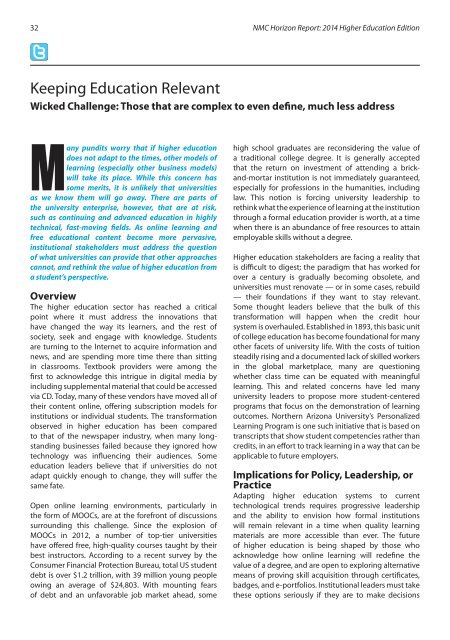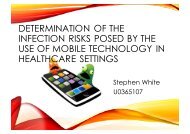NMC Horizon Report > 2014 Higher Education Edition
You also want an ePaper? Increase the reach of your titles
YUMPU automatically turns print PDFs into web optimized ePapers that Google loves.
32<br />
<strong>NMC</strong> <strong>Horizon</strong> <strong>Report</strong>: <strong>2014</strong> <strong>Higher</strong> <strong>Education</strong> <strong>Edition</strong><br />
Keeping <strong>Education</strong> Relevant<br />
Wicked Challenge: Those that are complex to even define, much less address<br />
Many pundits worry that if higher education<br />
does not adapt to the times, other models of<br />
learning (especially other business models)<br />
will take its place. While this concern has<br />
some merits, it is unlikely that universities<br />
as we know them will go away. There are parts of<br />
the university enterprise, however, that are at risk,<br />
such as continuing and advanced education in highly<br />
technical, fast-moving fields. As online learning and<br />
free educational content become more pervasive,<br />
institutional stakeholders must address the question<br />
of what universities can provide that other approaches<br />
cannot, and rethink the value of higher education from<br />
a student’s perspective.<br />
Overview<br />
The higher education sector has reached a critical<br />
point where it must address the innovations that<br />
have changed the way its learners, and the rest of<br />
society, seek and engage with knowledge. Students<br />
are turning to the Internet to acquire information and<br />
news, and are spending more time there than sitting<br />
in classrooms. Textbook providers were among the<br />
first to acknowledge this intrigue in digital media by<br />
including supplemental material that could be accessed<br />
via CD. Today, many of these vendors have moved all of<br />
their content online, offering subscription models for<br />
institutions or individual students. The transformation<br />
observed in higher education has been compared<br />
to that of the newspaper industry, when many longstanding<br />
businesses failed because they ignored how<br />
technology was influencing their audiences. Some<br />
education leaders believe that if universities do not<br />
adapt quickly enough to change, they will suffer the<br />
same fate.<br />
Open online learning environments, particularly in<br />
the form of MOOCs, are at the forefront of discussions<br />
surrounding this challenge. Since the explosion of<br />
MOOCs in 2012, a number of top-tier universities<br />
have offered free, high-quality courses taught by their<br />
best instructors. According to a recent survey by the<br />
Consumer Financial Protection Bureau, total US student<br />
debt is over $1.2 trillion, with 39 million young people<br />
owing an average of $24,803. With mounting fears<br />
of debt and an unfavorable job market ahead, some<br />
high school graduates are reconsidering the value of<br />
a traditional college degree. It is generally accepted<br />
that the return on investment of attending a brickand-mortar<br />
institution is not immediately guaranteed,<br />
especially for professions in the humanities, including<br />
law. This notion is forcing university leadership to<br />
rethink what the experience of learning at the institution<br />
through a formal education provider is worth, at a time<br />
when there is an abundance of free resources to attain<br />
employable skills without a degree.<br />
<strong>Higher</strong> education stakeholders are facing a reality that<br />
is difficult to digest; the paradigm that has worked for<br />
over a century is gradually becoming obsolete, and<br />
universities must renovate — or in some cases, rebuild<br />
— their foundations if they want to stay relevant.<br />
Some thought leaders believe that the bulk of this<br />
transformation will happen when the credit hour<br />
system is overhauled. Established in 1893, this basic unit<br />
of college education has become foundational for many<br />
other facets of university life. With the costs of tuition<br />
steadily rising and a documented lack of skilled workers<br />
in the global marketplace, many are questioning<br />
whether class time can be equated with meaningful<br />
learning. This and related concerns have led many<br />
university leaders to propose more student-centered<br />
programs that focus on the demonstration of learning<br />
outcomes. Northern Arizona University’s Personalized<br />
Learning Program is one such initiative that is based on<br />
transcripts that show student competencies rather than<br />
credits, in an effort to track learning in a way that can be<br />
applicable to future employers.<br />
Implications for Policy, Leadership, or<br />
Practice<br />
Adapting higher education systems to current<br />
technological trends requires progressive leadership<br />
and the ability to envision how formal institutions<br />
will remain relevant in a time when quality learning<br />
materials are more accessible than ever. The future<br />
of higher education is being shaped by those who<br />
acknowledge how online learning will redefine the<br />
value of a degree, and are open to exploring alternative<br />
means of proving skill acquisition through certificates,<br />
badges, and e-portfolios. Institutional leaders must take<br />
these options seriously if they are to make decisions



